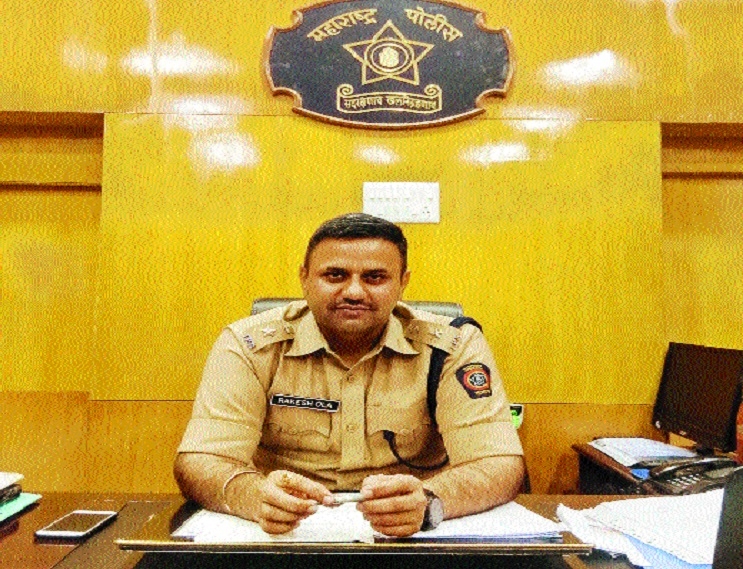Rakesh Ola: Judiciary’s loss, force’s gain
| Date :19-May-2019 |

By Dheeraj Fartode:
BEHIND every happy daughter is a truly amazing parent who fights all odds for her. Rakesh Ola, a Judicial Magistrate-turned-Indian Police Service (IPS) Officer, is one such example. For seven years, Ola was serving in rural Rajasthan as Magistrate in Rajasthan Judicial Services (RJS). His postings in the hinterland posed a big question on providing quality education to his then four-year-old daughter. The thought of her future spurred Ola to opt for Civil Services examinations. Riding on self-belief and self-study he cleared the examinations and finally donned Khaki. Judiciary’s loss was Police’s gain but it was all for his daughter’s happiness.
Born in a police family in Jaipur, Rajasthan, Ola was an average student. He failed to get admission in medical college due to poor performance in the Pre Medical Test (PMT). He retook the test but failed again. He then pursued B.Sc and LLB and became Magistrate after clearing RJS examination in the year 2004.
Ola represents 2012 batch of IPS. During his first posting at Shrirampur in Ahmednagar district, Ola had busted the infamous Irani gang in 2014. He later shifted to communally sensitive Malegaon as Additional SP in May 2016 and was later transferred to Nagpur as Deputy Commissioner of Police (DCP) Zone I in June 2017. While serving as DCP Zone I, Ola busted many inter-state gangs of thieves and also detected serious offences.
After taking reins of Nagpur Rural Police, Ola carried out massive crackdown on sand-mafias and bovine smuggling. He is a man of wise words who knows ground realities and does not indulge in making false
claims. Khaki blends well with his tall personality. In a freewheeling chat with ‘The Hitavada’, Ola shared his experiences of policing and judiciary.
Q. What are the challenges for a police officer?
A. There are day-to-day challenges in policing. You never know which challenge would come up. A cop faces challenges in the form of law and order situation, illegal activities and serious crime everyday. But such challenges motivate me to work more passionately.
Q. Has it affected your personal life?
A. My family is used to it as my father was officer with Rajasthan Police. Now, my wife also has adjusted to the situation.
Q. What are the differences you observed as judicial magistrate and now as a police officer?
A. A judicial magistrate take a decision after studying evidence while police are the first responders to any critical situation. Many a time, poor people fail to reach court as filing a litigation or hiring a lawyer requires lot of money. However, a policeman can give relief to victim immediately by filing First Investigation Report (FIR) and arresting accused. Along with crime detection, crime prevention is the most important aspect of policing that safeguards society.
Q. What are the focal points of your policing?
A. People need to trust capability of police and repose faith in the force. So, I always try to win trust of people. Society’s backing provides much-needed strength to work towards maintaining law and order situation effectively. At the same time, men in uniform have their task cut out wherein the criminals should fear their action.
Q. What measures have you taken after taking the reins of SP, Rural?
A. Proper supervision of every investigation and chargesheet is
my first priority. We have intensified checking of criminals in district. Activity of history-sheeters is being monitored by policemen on daily basis and special teams have been constituted for it. Patrolling has also been intensified in sensitive areas of the district. Investigation of all serious offences is being monitored by senior rank officials to secure conviction. We are conducting meetings of villagers at police station level and sub-divisional level and hearing their grievances. I am personally meeting villagers including Police Patils and Sarpanch during my visits to the police stations to gain confidence of people and understand ground reality.
Q. What are the challenges of policing in Nagpur district?
A. As national highways are passing through the district, preventing accidents on these roads is the major concern for police. Curbing illegal sand excavation, smuggling of bovine, coal thefts, illegal liquor transportation to Chandrapur and Wardha districts and illegal passenger transportation are also major challenges.
Q. What action have you taken to prevent road accidents?
A. We have removed 20 black spots out of 32 identified by carrying out road engineering methods. It helped the police to reduce number of road fatalities from 370 reported in the year 2017 to 340 in 2018. Traffic police are continuously initiating action against illegal transportation of passengers and imposing fines. A total of 6,047 vehicles were challaned in 2018 and 2,066 in first four months of this year.
Q. What about detection rate and preventive action?
A. Police have recorded 89 per cent detection rate last year. Almost all major crimes were solved by our men. Preventive action was taken against more than 6,200 persons in the district and two goons were booked under MPDA. Our message is clear to the criminals: Do not mess with us.
Q. Tell us about action against illegal sand excavation.
A. Rural police have conducted special drives against illegal sand transportation and registered 170 cases in 2018 and seized material worth Rs 25 crore.
Q. Still, police have failed to stop illegal activities completely.
A. No one can stop these activities hundred per cent. We are trying to curb it. It needs social reformation to stop it. We are trying our level’s best to put check on illegal activities and succeeded too in our mission. If you find any loopholes in our action then tell us.